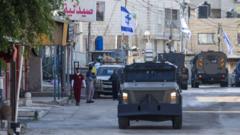In a significant escalation of military activity, Israeli forces launched a major operation in Jenin, resulting in the deaths of nine Palestinians, according to reports from the Palestinian health ministry. The multi-faceted operation involved air strikes and a substantial troop presence, which included drones, helicopters, and armored bulldozers in and around the city and its refugee camp.
Israeli Prime Minister Benjamin Netanyahu characterized the operation, termed "Iron Wall," as a strategic measure aimed at "defeating terrorism" in Jenin, a known stronghold of Palestinian armed groups. This incident follows a recently initiated ceasefire in Gaza and brings to light the precarious security situation in the West Bank, where violent encounters between Palestinians and Israeli settlers have been reported.
Jenin's governor, Kamal Abu al-Rub, described the military efforts as an "invasion," with heavy military equipment overwhelming the area. Reports indicated that Israeli forces were effectively besieging the Jenin refugee camp, with armored vehicles creating disturbances in local infrastructure. Notably, medical personnel, including three doctors and two nurses, sustained injuries during the operations.
Palestinian security forces reportedly retreated from their positions as Israeli troops entered Jenin on Tuesday morning, prompting Brig-Gen Anwar Rajab to claim that Israeli forces fired upon both civilians and security personnel, leading to multiple casualties. By Tuesday evening, the toll had risen to nine identified victims, including an adolescent.
In light of these events, Prime Minister Netanyahu emphasized that this operation aligns with Israel's broader security goals against Iranian influence and armed groups in the region. He asserted that actions would continue “as long as necessary” to dismantle perceived threats.
The Palestinian Authority condemned the military incursion, deeming it part of a relentless series of aggressive actions against Palestinians in the territory. In a not-so-distant context, groups such as Hamas and Palestinian Islamic Jihad urged West Bank residents to intensify retaliatory actions in response to the Israeli move.
Underlying this military framework is the ongoing pattern of violence since the October 7, 2023, attack by Hamas on Israel, which has precipitated a series of Israeli military raids, claiming numerous Palestinian lives and transforming the security landscape.
Further complicating matters, incidents of settler violence have surged, punctuated by masked extremists attacking Palestinian communities and destroying property in areas like Jinsafut and al-Funduq. These actions reportedly left several Palestinians injured while also resulting in injuries among Israeli civilians during subsequent police engagements.
In a political twist, reports surfaced of the new U.S. administration lifting sanctions on Israeli settlers involved in previous attacks in the West Bank. This policy shift drew both support from pro-settler officials and condemnation from Palestinian leaders who interpreted the move as an encouragement for settler aggression against Palestinian communities.
As tensions simmer, recent releases of Palestinian prisoners, part of a ceasefire agreement and hostage negotiations, contribute to the volatile atmosphere, further intensifying concerns over the region's future stability. Where Israeli military operations are rigorous, the human costs bear witness to the ongoing struggle and complex narratives that surround the Israeli-Palestinian conflict, underscoring the challenges in achieving lasting peace in the region.



















